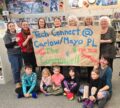Commentary
A swan song worth singing
December 18, 2018

Dec. 18, 2018
By Nate Smelle
Although coping with loss can be one of the greatest challenges in life, it can also provide us with a unique opportunity for personal growth. Recently, I’ve been fortunate and unfortunate enough to be faced with several opportunities and challenges of this nature. One of these challenging opportunities came my way as I was driving home from the office on the evening of Nov. 27. While turning from Hastings Street North onto Bridge Street in Bancroft, I was forced to slam on the brakes when the vehicle ahead of me abruptly stopped. Swerving to avoid the collision, I hit a patch of ice and lost control of my car, sliding directly into the back of a transport truck fully loaded with wood products, which had come to a stop after skidding onto the wrong side of the road earlier.
Before I realized what had happened, I felt my face go numb as my forehead hit the steering wheel and the airbag delivered a powerful uppercut to my jaw. Within minutes, the police were on the scene and the paramedics were loading me into the back of the ambulance. When I arrived at the hospital a team of nurses quickly transferred me from the stretcher to a bed, where I spent the next six hours going through a series of tests and X-rays to determine the extent of my injuries. Nothing broken except for my car, I was discharged just after midnight with a diagnosis of whiplash and back spasms.
Spending the better part of the next couple days in bed, I returned to the hospital for a follow-up appointment on Thursday afternoon. Sitting uncomfortably in the waiting room for nearly four hours, I distracted myself from the pain by catching up on the news I had missed over the previous 48 hours. Scrolling through my email notifications, I learned that the world had lost one of its most effective advocates for peace and social justice. At 3:39 a.m. on the morning of Nov. 28 world-renowned journalist and author Harry Leslie Smith passed away while in the intensive care unit of the Belleville hospital.
Last May, I was lucky enough to have the chance to speak with Smith in person regarding his life’s work. At 95 years old, Smith – the son of a coal miner unable to work due to a severe workplace injury – had earned the title of “the world’s oldest rebel.” During our conversation, he shared with me some of his experiences of living in extreme poverty throughout the Great Depression. Emphasizing the vital importance of our public services, he told me how due to a lack of health care in England in the 1920s his three-year-old sister had died of tuberculosis.
Pointing out that many of our elected officials in Canada are working to privatize public services such as health care, Smith said our government had lost sight of what people value most: a healthy and peaceful quality of life. Instead of acting in the best interest of the people they are supposed to represent, he said far too many politicians nowadays tend to cater to the greed of the world’s wealthiest one per cent. In the guise of finding efficiencies, Smith said governments are choosing to perpetuate this gross income inequality because serving the interests of big business and corporate elites helps these individuals hold onto power.
When I asked him why so many politicians decide to discard their civic duty for their own personal gain, he said “The people that are running the country like it that way. They think it has always been that way, so why change it.”
By stripping away our public services such as health care and education, Smith said governments are dismantling the social structure that ensures people from all walks of life are treated with fairness and decency. When I told Smith I lived in Bancroft, he said people in communities such as ours tend to feel the crunch of austerity more severely than those in urban centres because of the lower incomes and higher cost of living we endure. For that reason, he said we must stand up for the public services we value, or else we will lose them.
Going over our discussion in my head as I continued waiting to see the doctor, the title of Smith’s last book, Don’t Let My Past Be Your Future, began to make more sense. Thinking of the paramedics, doctors, nurses and police who took care of me in my time of need, I felt a deep sense of gratitude as I imagined what my experience over the prior few days would have looked like without their assistance. In my case, without publicly funded health care I certainly would not have been able to afford the care and medication I needed to heal properly. The fact that there are still elected officials diligently fighting to take these essential services away from us in 2018, when they know full well that most people do not have the financial resources necessary to maintain a good state of health is atrocious.
















